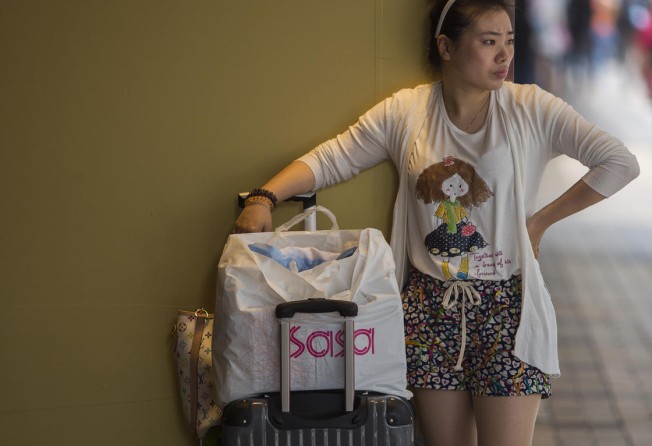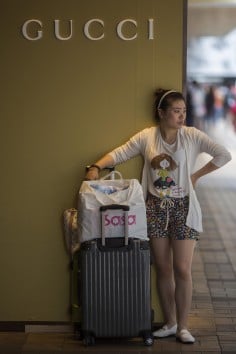
The tricky business of trading places, thanks to Hong Kong-mainland Cepa deal
10 years on, a two-part series looks at the impact of Cepa, a deal aimed at fostering economic ties between Hong Kong and the mainland

A decade ago, Causeway Bay was a tourist hot spot with a thriving array of boutiques, wonton noodle shops and decades-old bakeries amid the glitzy shopping malls. Shoppers who were not speaking Cantonese were likely to be conversing in Japanese or English.

The sweeping changes in Causeway Bay are one of the most visible signs of the effects of the Closer Economic Partnership Arrangement (Cepa), a free-trade agreement between the central government and Hong Kong signed a decade ago this month. The deal, agreed in the wake of the severe acute respiratory syndrome outbreak that left Hong Kong on its knees, was intended to pry open the expanding mainland market for Hong Kong businesses.
As part of the agreement, which has since been expanded, mainlanders from some regions were able to travel to the city individually, rather than in tour groups. Hong Kong banks have been able to set up branches across the border and law firms establish representative offices. Hong Kong accounting firms and telecommunications services providers will be allowed to operate in the new border district, Qianhai, on a trial basis.
"Overall, Cepa has been helpful to Hong Kong," Hong Kong Brand for China Market Association chairman Andy Lee Chi-hung said.
"It injected much-needed life into the city when Sars nearly [floored] the economy."

Such was his success that he started the association three years ago to offer free advice to entrepreneurs looking to break into the robust mainland consumer market.
"Cepa has since dramatically modified the ways Hong Kong investors make forays into the mainland market," Lee said. Hong Kong companies are allowed to set up wholly owned retail businesses to compete on an equal footing with private mainland enterprises in Guangdong, which was impossible before Cepa."
But Cepa has its critics. Many Hongkongers say the trade pact and the influx of mainland visitors it prompted has led to social tension, with mainlanders competing with locals for everything from baby milk to flats and maternity services in hospitals.
Analysts say the undoubted winners are the city's landlords.
Luxury home prices are almost quadruple their pre-Cepa levels, and rents for prime spots in Causeway Bay and Tsim Sha Tsui have increased almost three times, according to property consultant CBRE.
The sky-high rents squeezed many smaller businesses, including wonton noodles shops and boutiques out of Causeway Bay. They lost out to bigger players such as jewellery chains Chow Tai Fook and Chow Sang Sang. Chow Tai Fook, controlled by property tycoon Cheng Yu-tung, has doubled the number of stores in Hong Kong to 80.
According to the latest government figures, about six out of 10 mainland visitors over the past decade came through the individual travel scheme, or 90 million visits by people from the 50 cities where the scheme is now in effect.
Many solo travellers come from neighbouring cities such as Shenzhen and Guangzhou for day trips or weekend shopping.
The retail sector has been the main beneficiary, with analysts estimating more than one-third of local retailers' revenue comes from mainland visitors. Their visits have also left hotels packed.
Cathy You, a Beijing-based full-time mother of a five-year-old girl, visits Hong Kong twice a year on average.
"I come for shopping and eating, and Disneyland," said You, 36. "I am a fan of big brands, so Hong Kong is really a paradise for me to shop for clothing, handbags and shoes."
You recalled her last trip to the city in December, when she and her husband spent HK$60,000 on a Chanel handbag, a Hermes leather belt and several tops. They also bought family and friends some dried food and patent drugs as gifts.
"People believe what's from Hong Kong is safer and of a better quality," she said.
But while the property market at home has boomed, local property agents are having little luck across the border.
"Cepa does not provide any significant help," said Shih Wing-ching, founder of Centaline Property Agency. "Property is a localised market. Even though we have the licences, we cannot compete with mainland agents."
He said Centaline had expanded rapidly on the mainland, but not because of Cepa.
"Most of the company's agents are mainlanders, who know the market well," Shih said.
The mainland and Hong Kong now recognise the qualifications of each other's real estate appraisers and surveyors.
But Hong Kong surveyors are not allowed to take on mainland jobs unless they are employed by mainland appraisers. But the mainland appraisers are not as popular as international surveying firms.
Hong Kong banks have seen more pros than cons in Cepa, which allows them to set up "cross-location" sub-branches in Guangdong. The capital requirement for a sub-branch is 10 million yuan (HK$12.54 million), or 10 per cent of the requirement for a full branch.
Bankers said the measure helped the banks branch out across the border, raise their brand awareness and paved the way for more business opportunities if the mainland's capital account is liberalised.
"All foreign players [including Hong Kong-based banks] on the mainland are small," said Andrew Fung, executive director and head of global banking and markets at Hang Seng Bank. "We can't compete with the big four state-owned banks directly."
Cepa enabled more interaction between banks in the city and customers across the boarder, he said.
Another banker called for further relaxation in the mainland's capital account so that firms could invest freely without geographical barriers.
"This would bring a lot more money flows," he said.